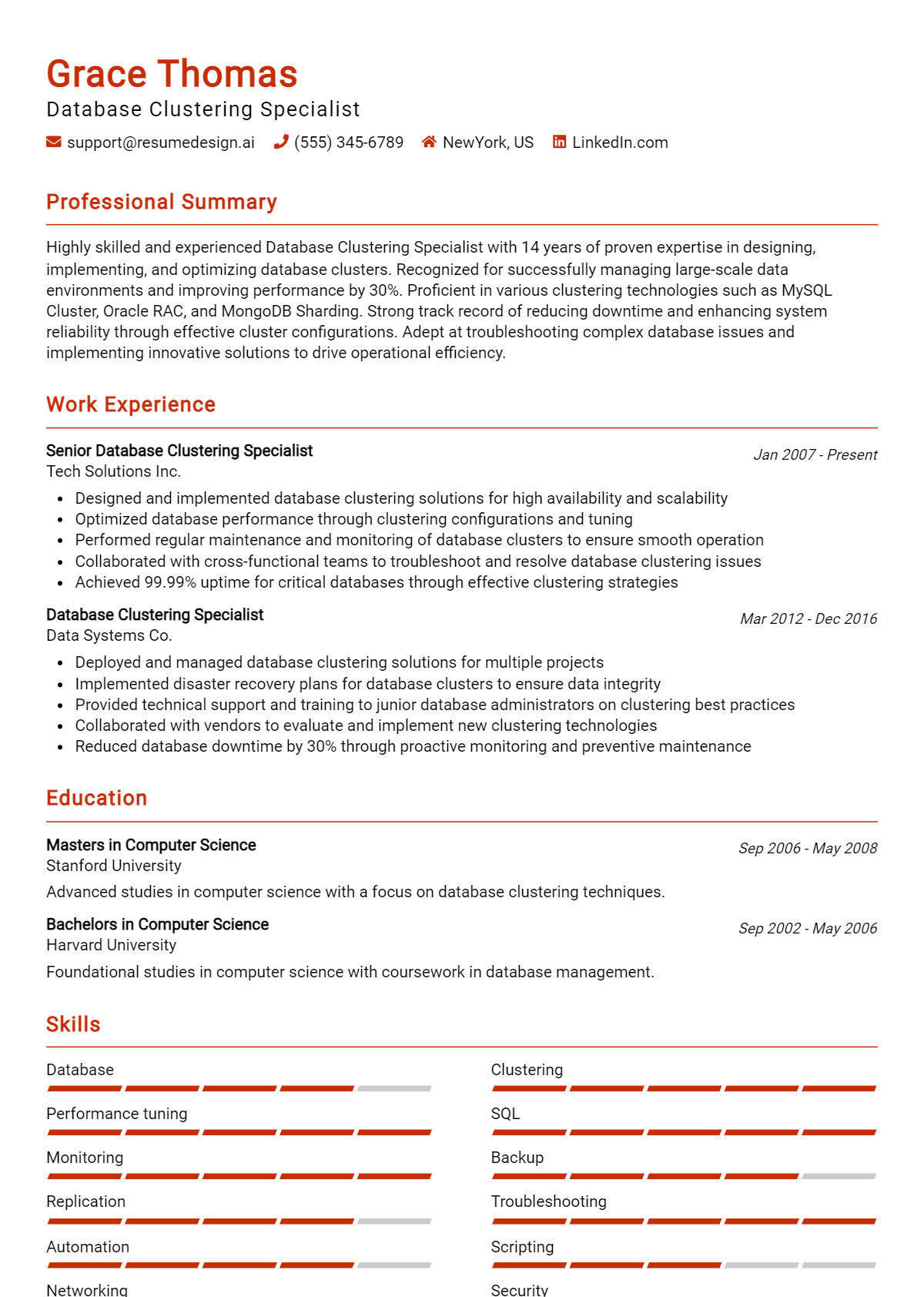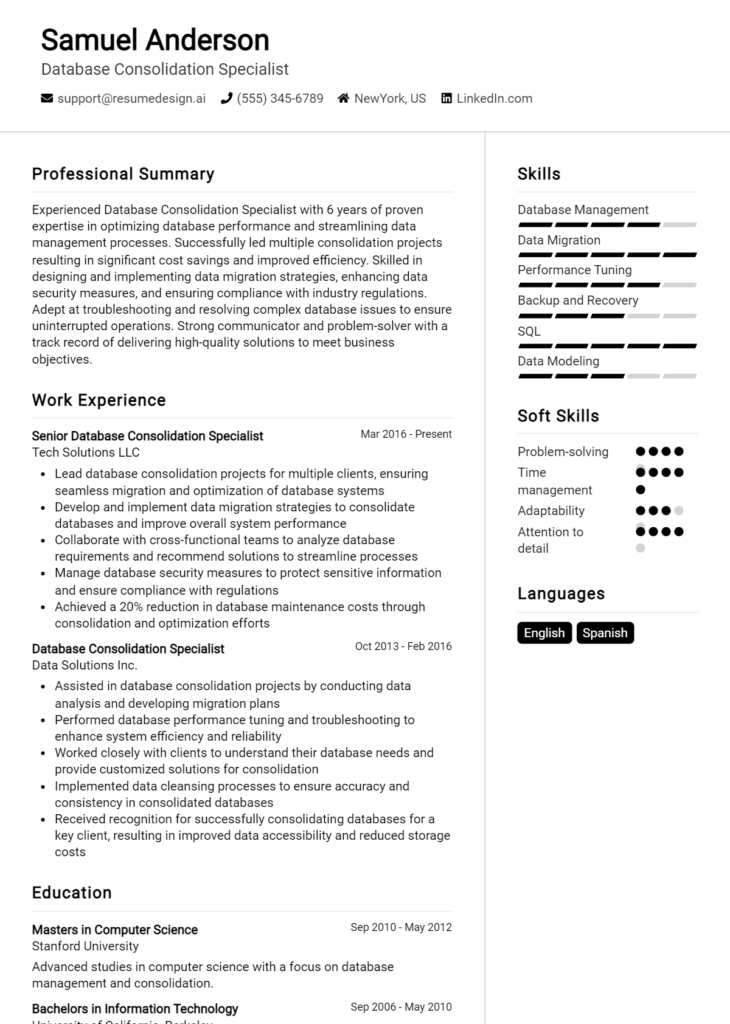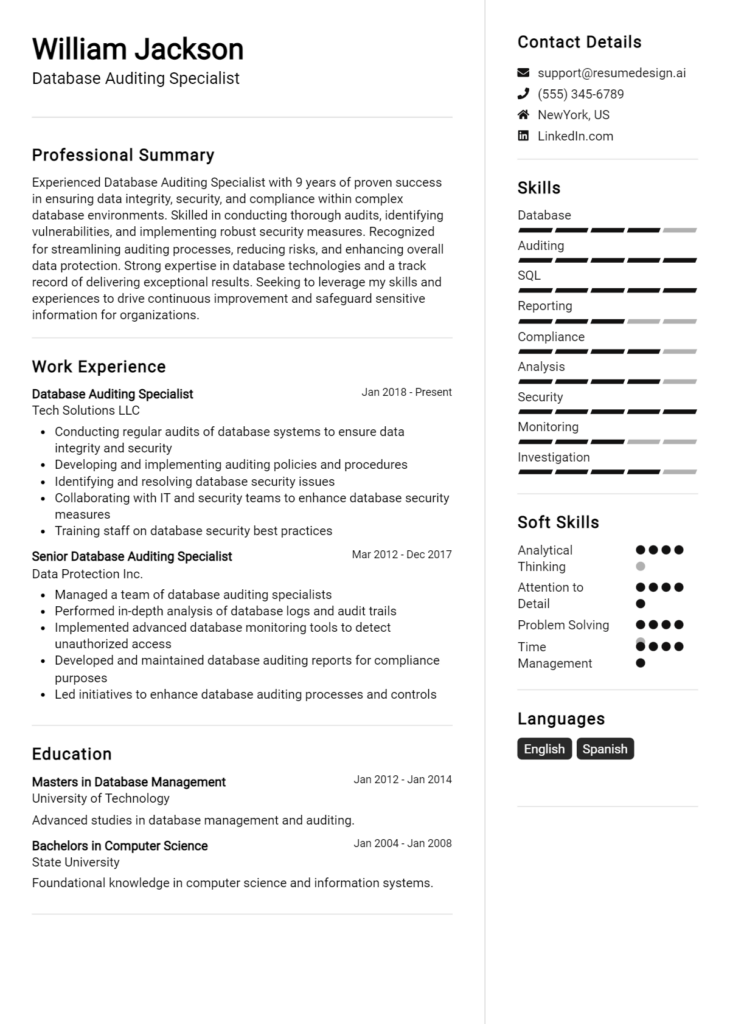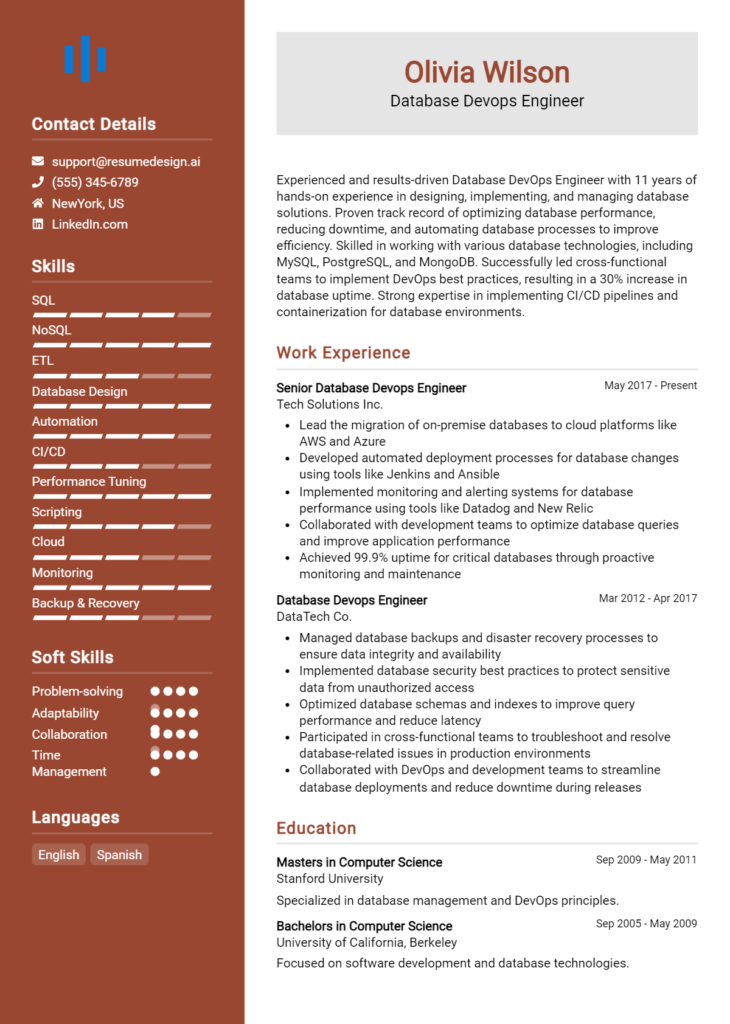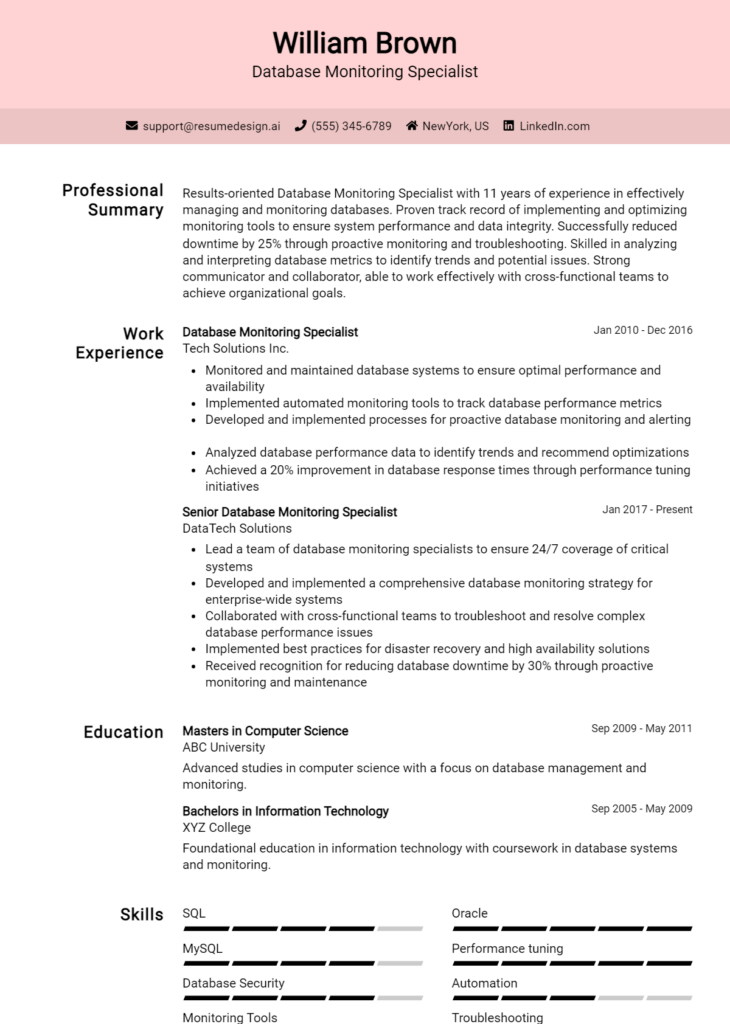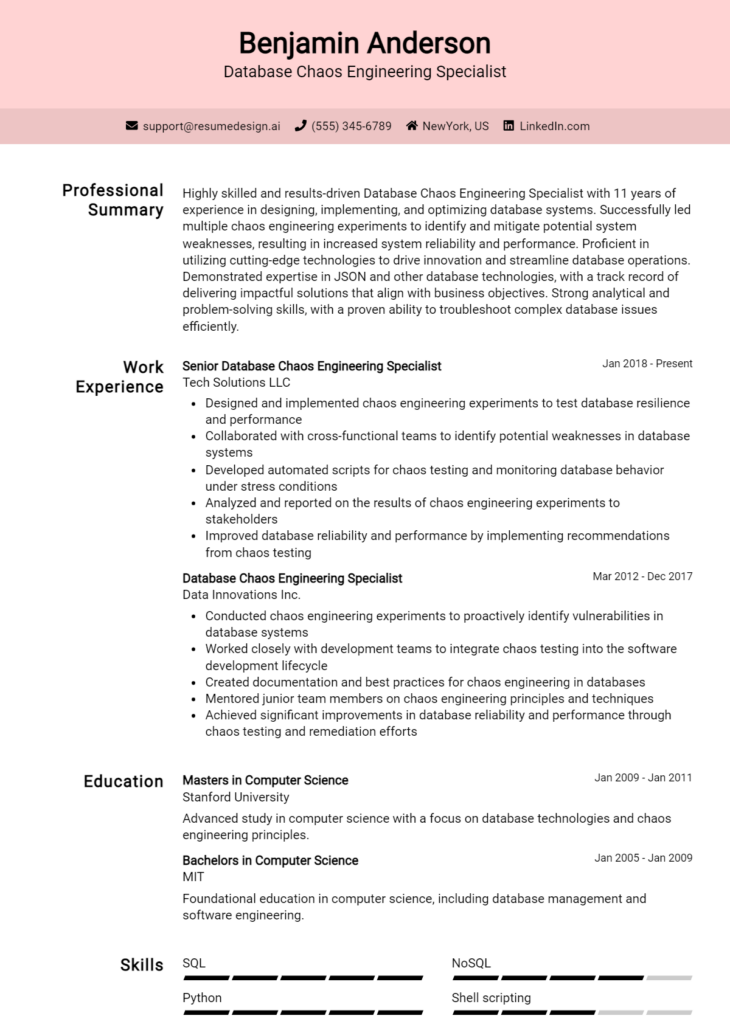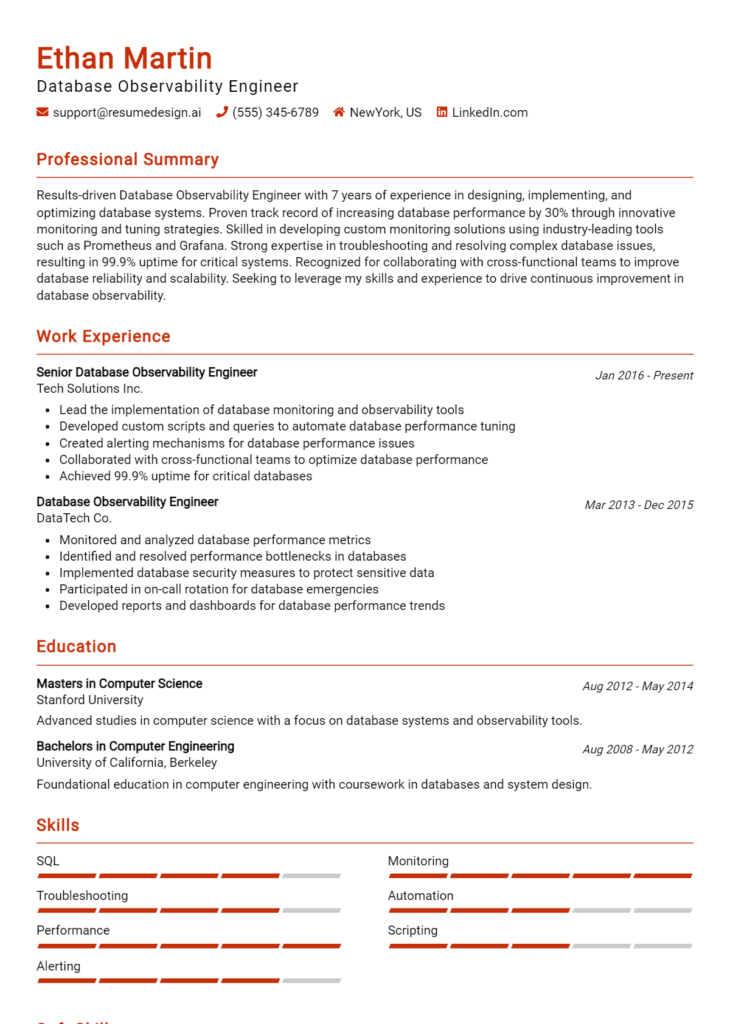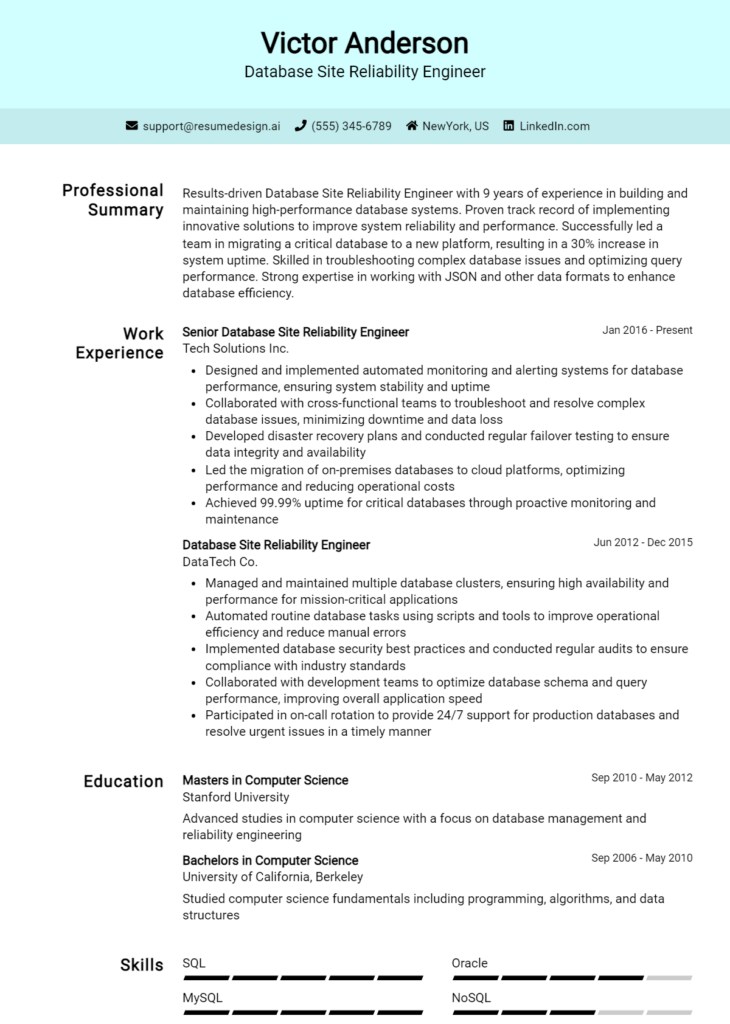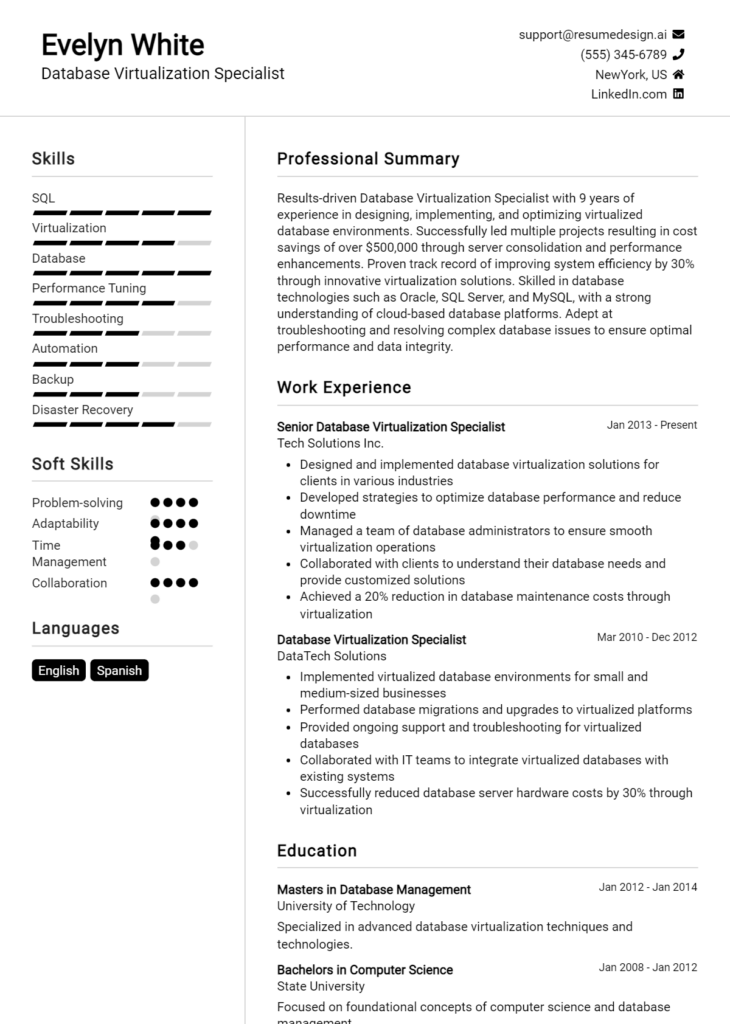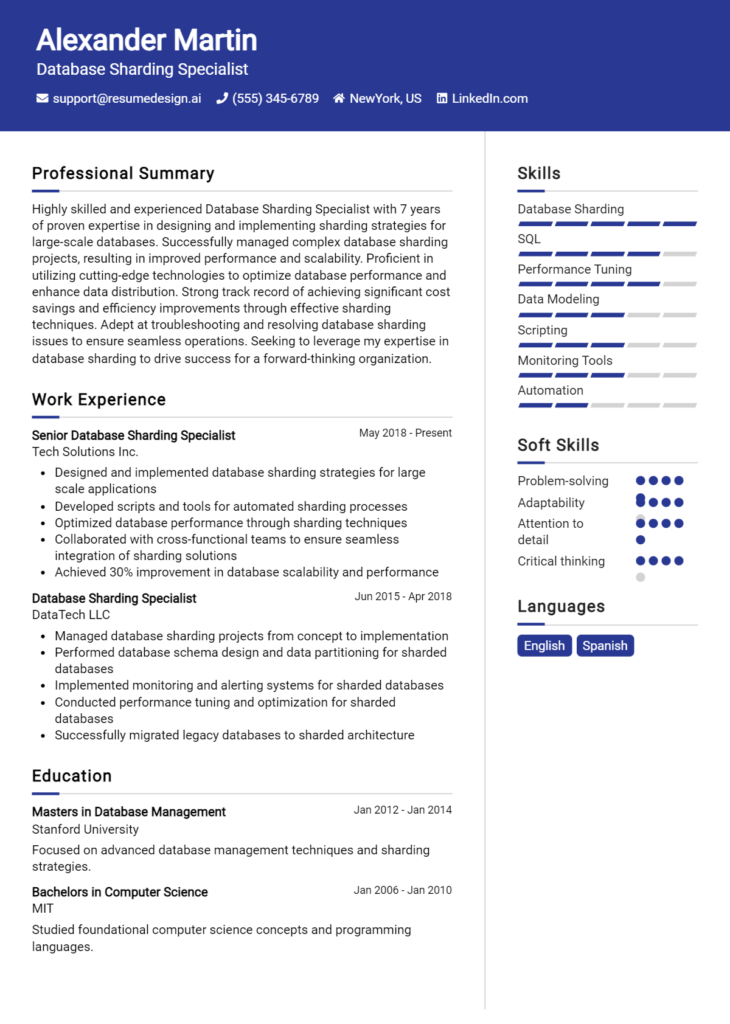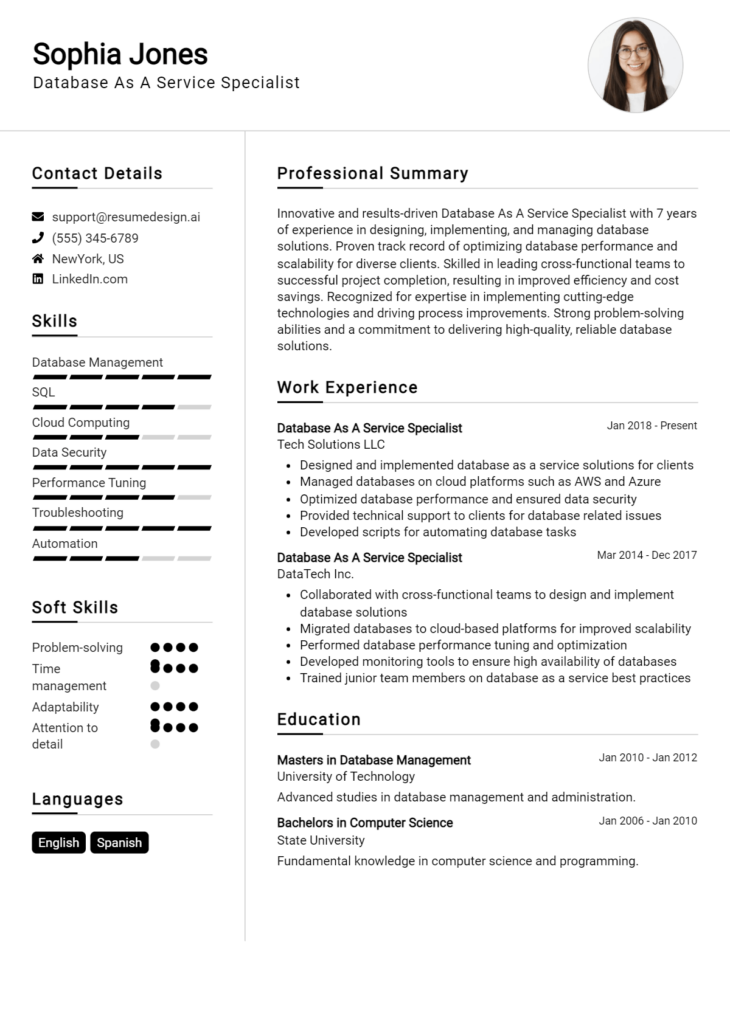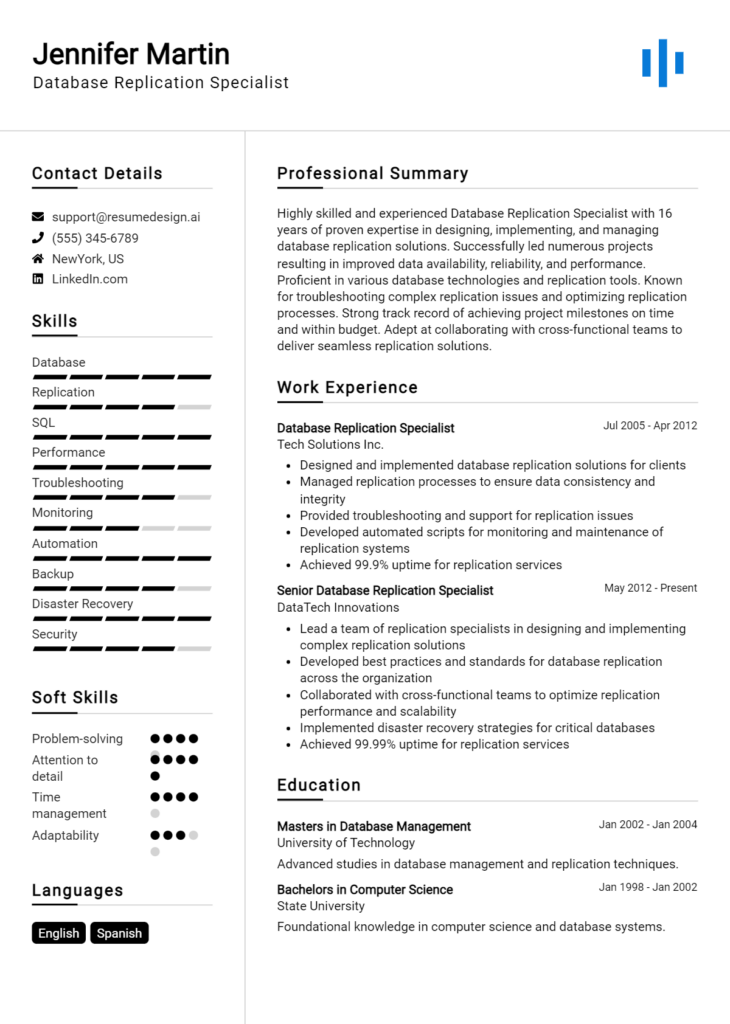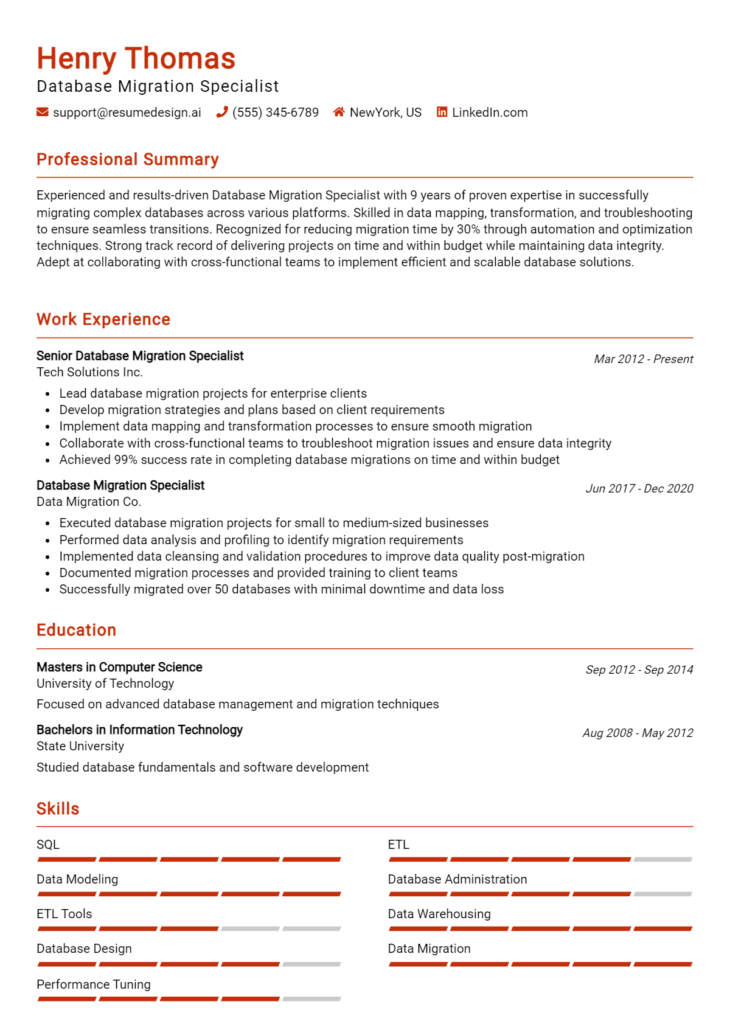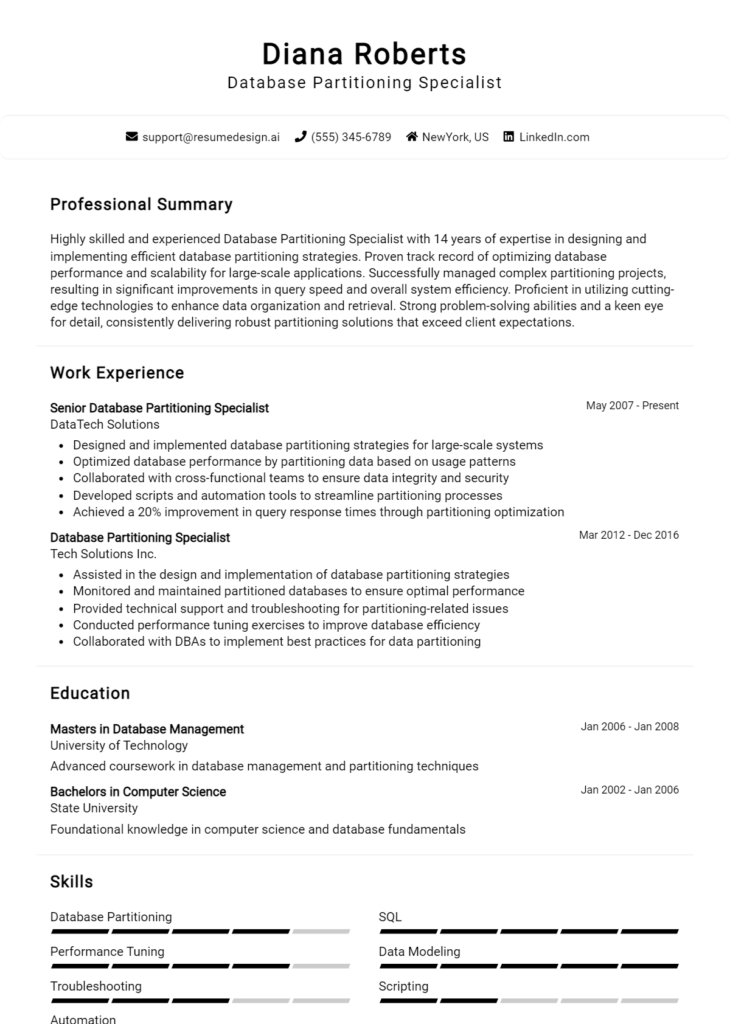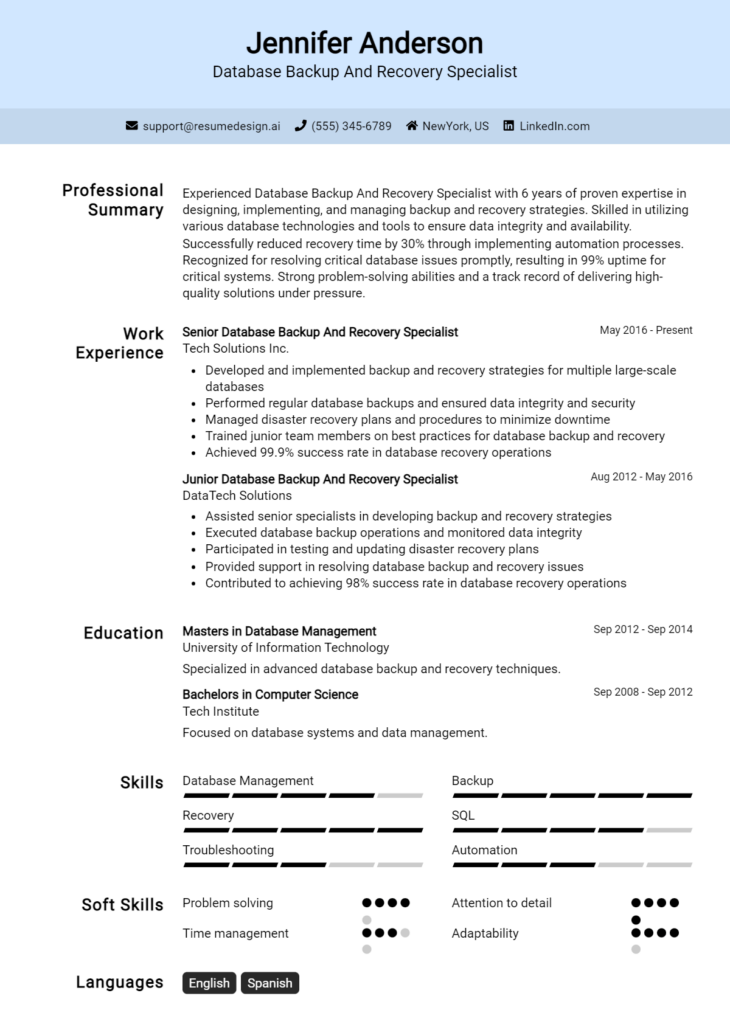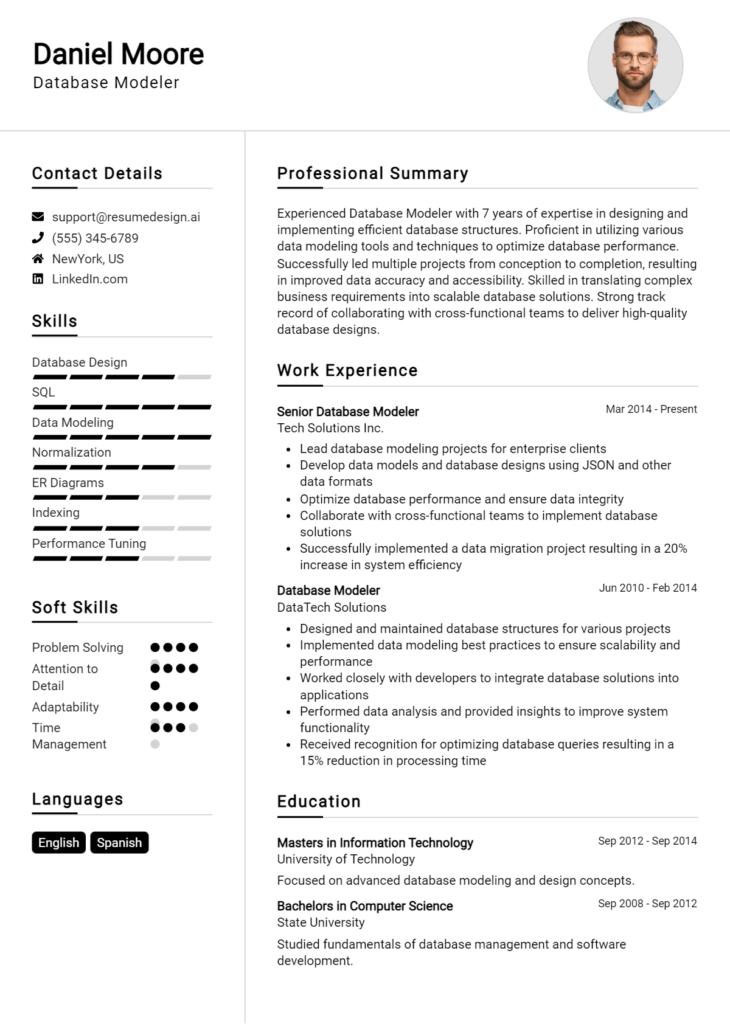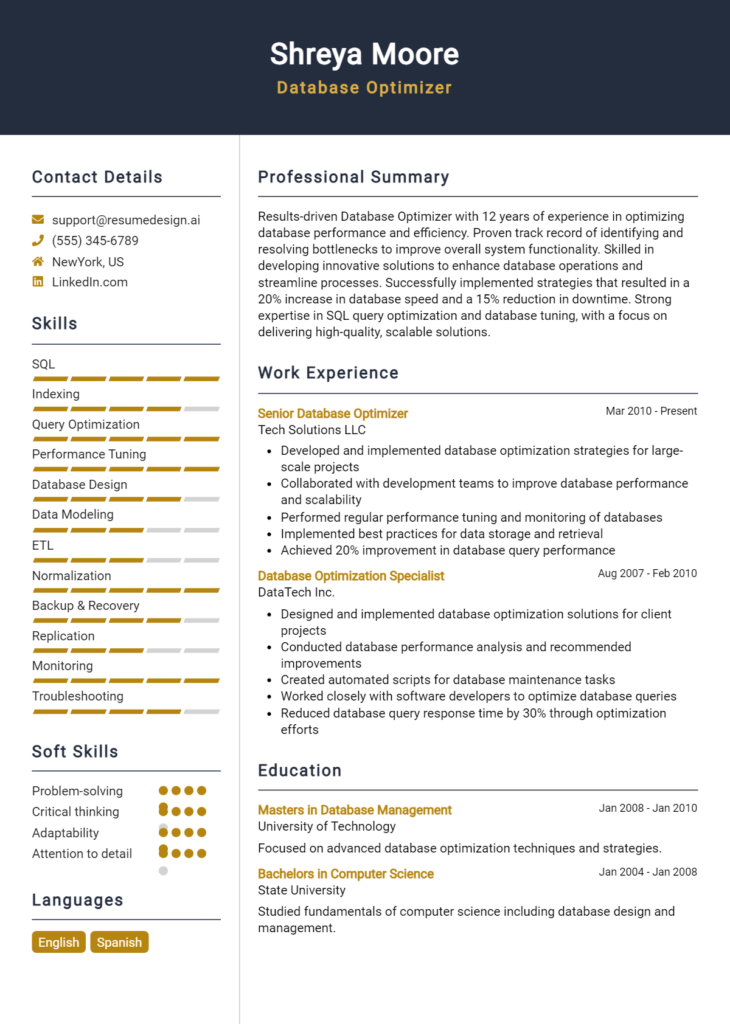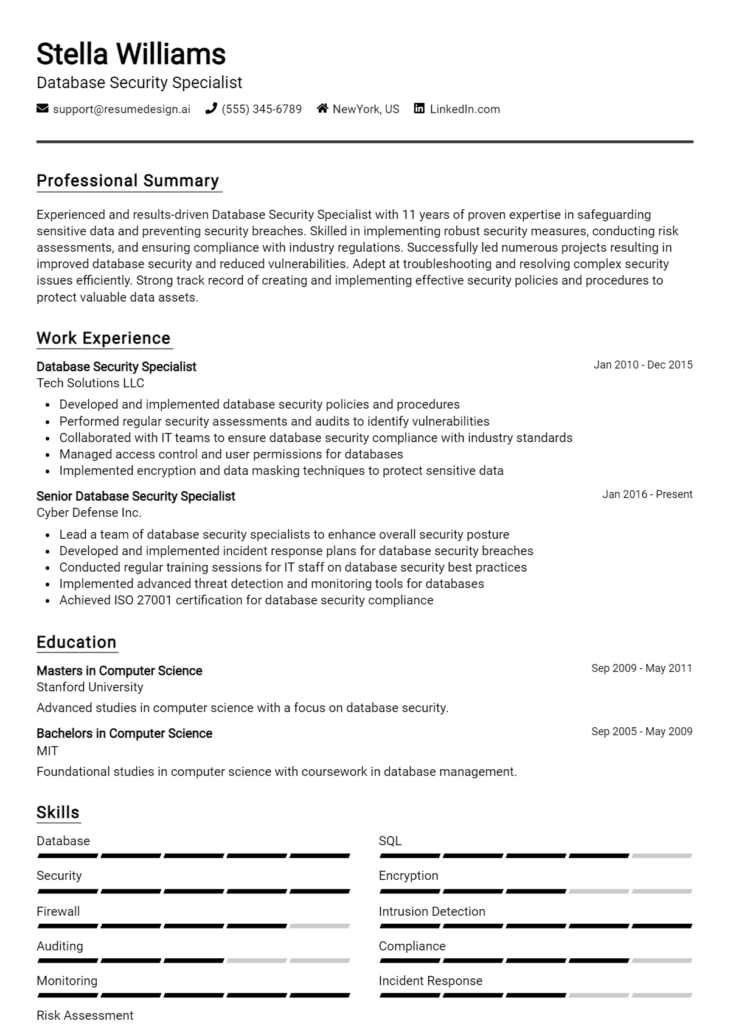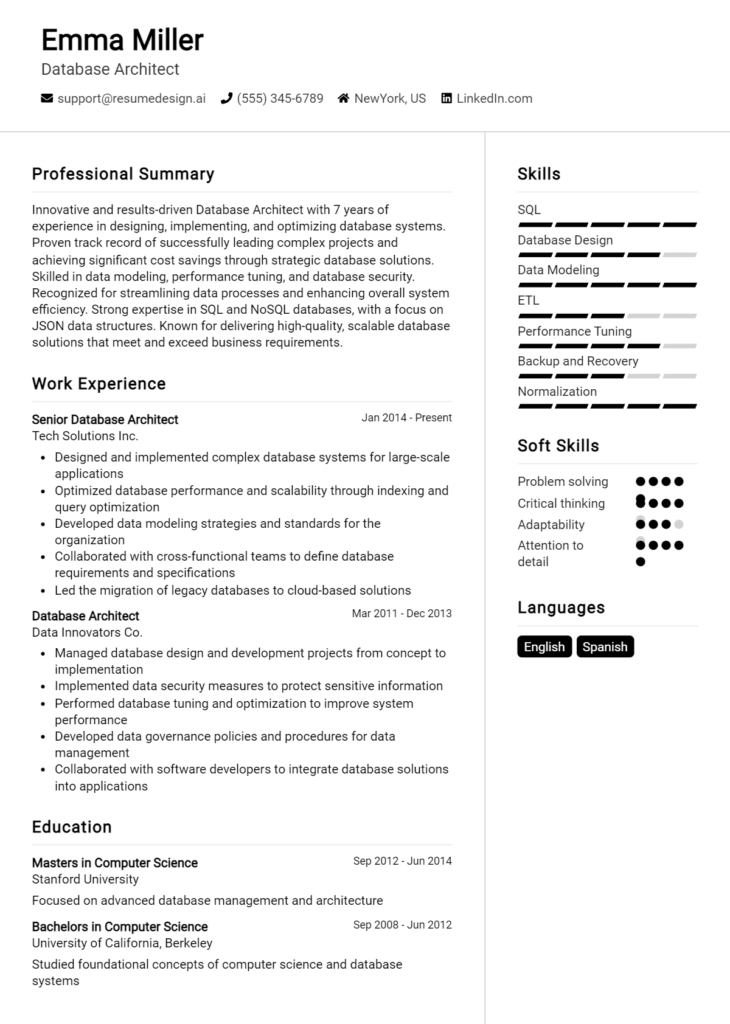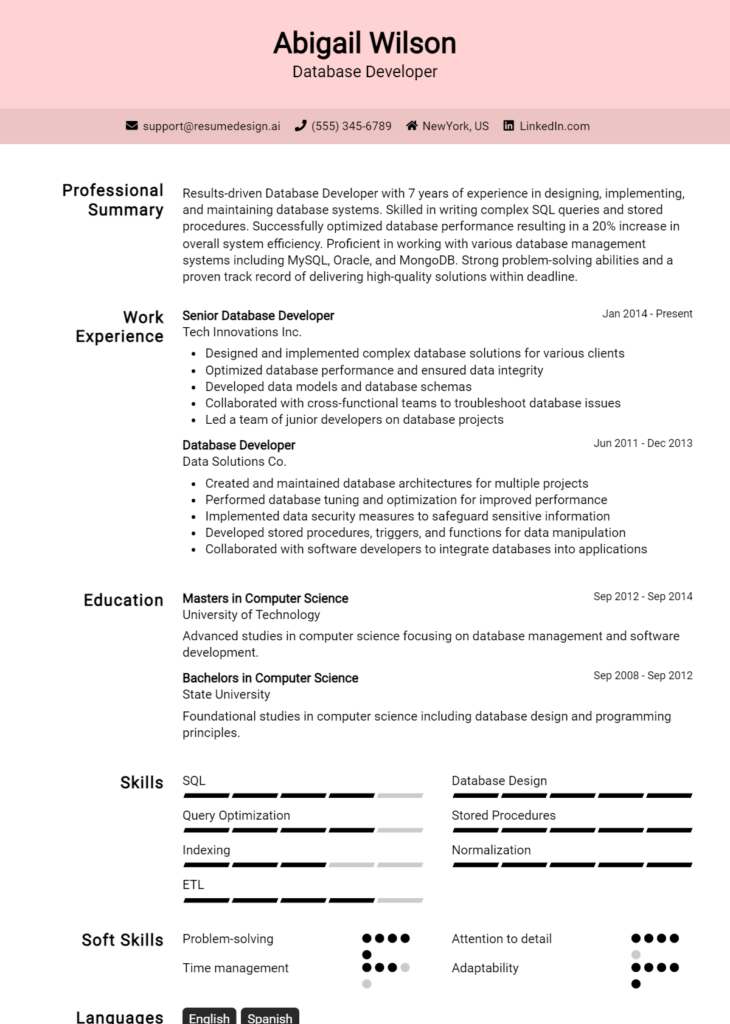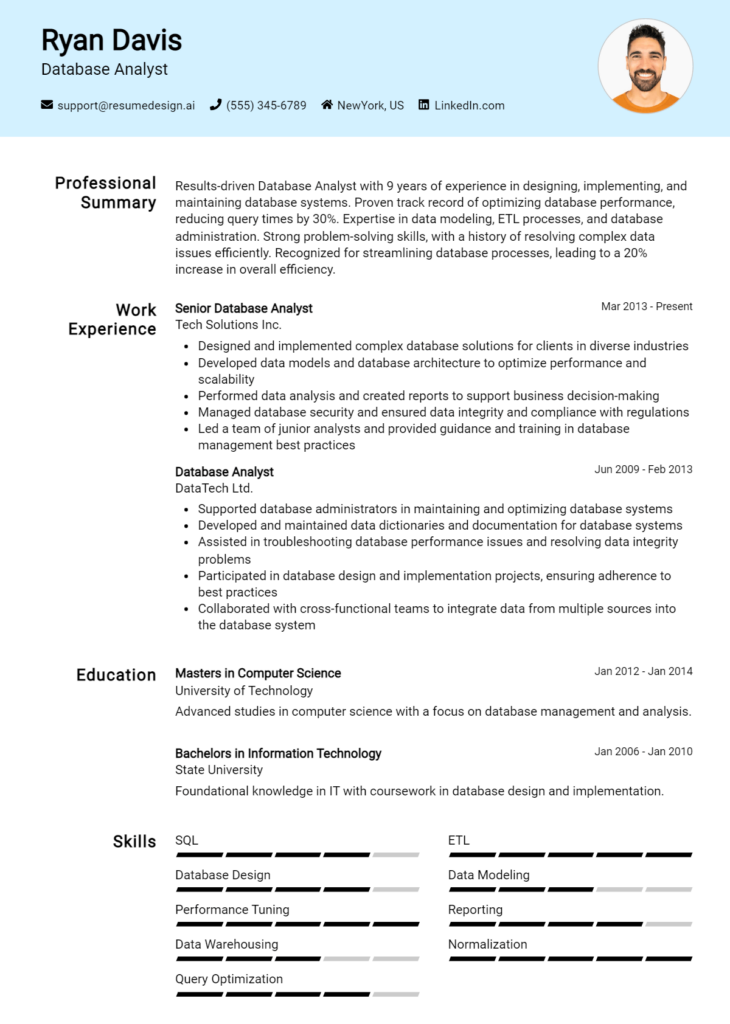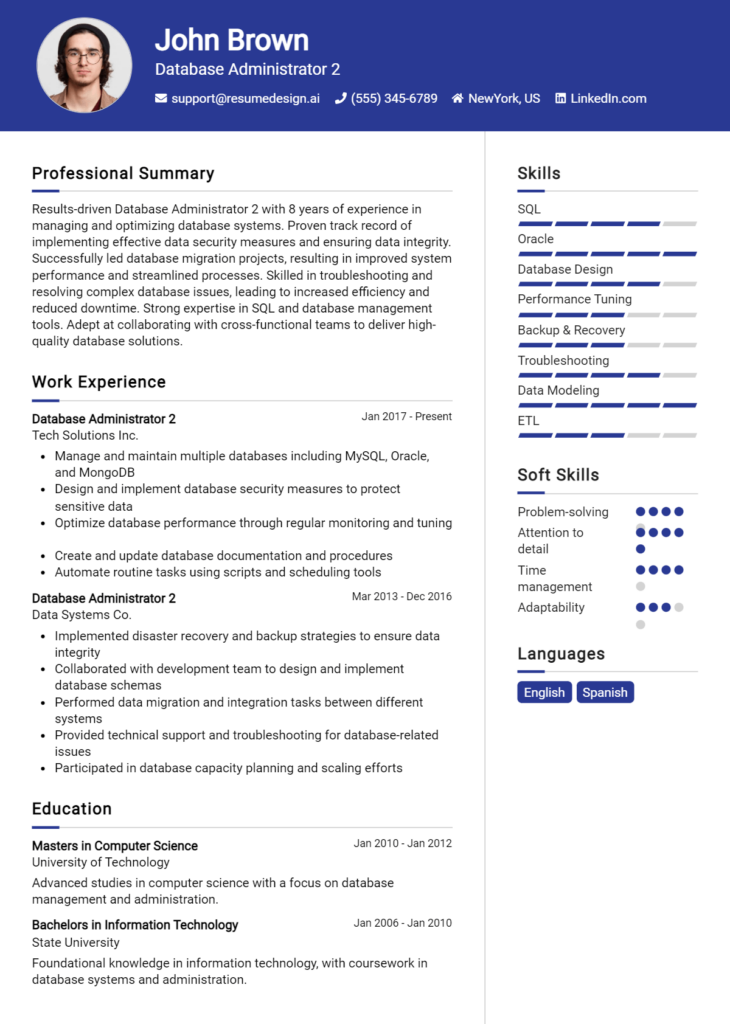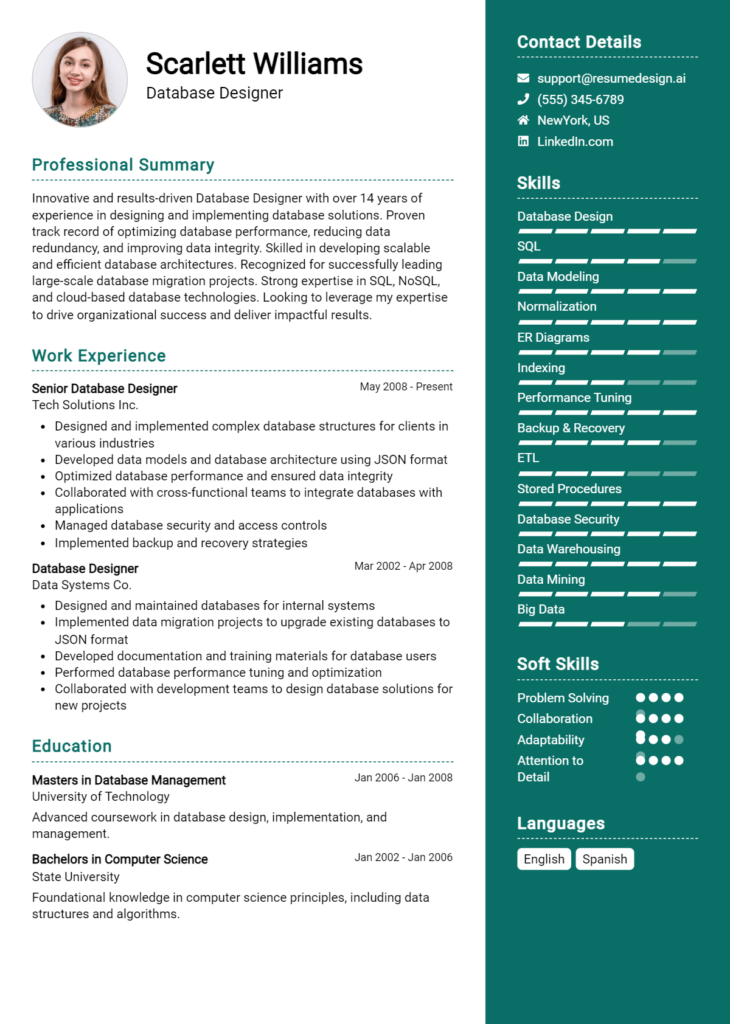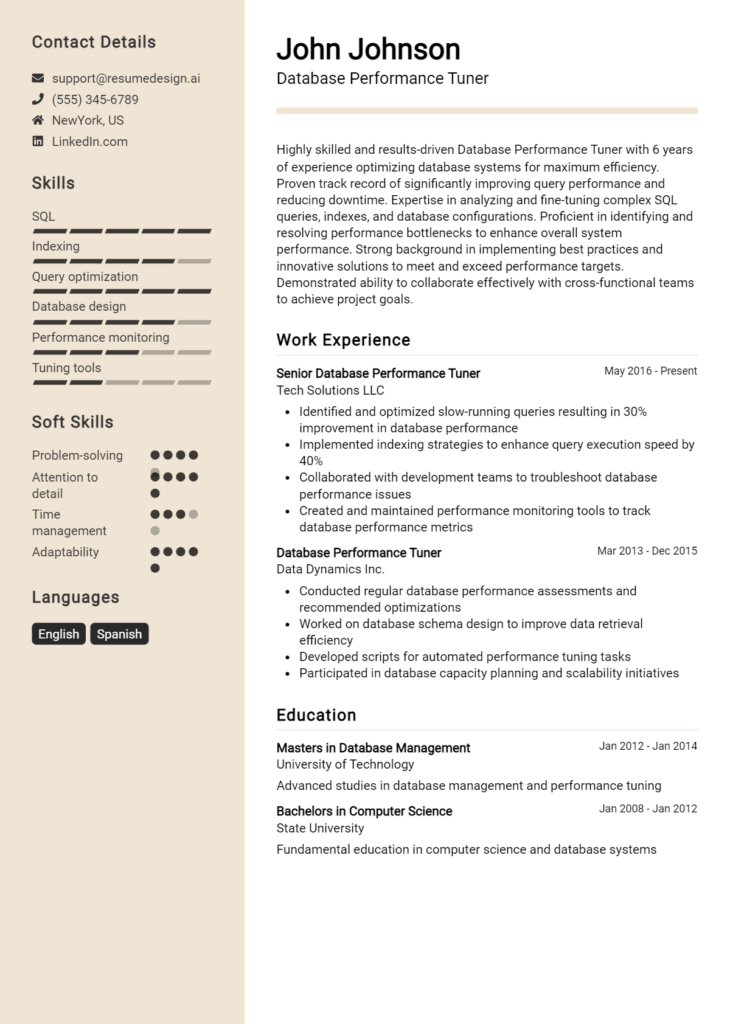Database Clustering Specialist Core Responsibilities
A Database Clustering Specialist is essential for ensuring high availability and performance of database systems. Key responsibilities include designing, implementing, and maintaining clustered database environments, collaborating with development and operations teams to optimize data access, and troubleshooting issues across platforms. This role demands strong technical skills in database management, operational efficiency, and problem-solving. Effective communication is crucial for bridging departments, and a well-structured resume highlighting these abilities can significantly enhance career prospects and contribute to the organization's success.
Common Responsibilities Listed on Database Clustering Specialist Resume
- Designing and implementing database clustering solutions.
- Monitoring and optimizing database performance and availability.
- Collaborating with software developers and IT teams.
- Troubleshooting and resolving database-related issues.
- Conducting regular backups and disaster recovery planning.
- Ensuring data integrity and security across clusters.
- Creating documentation for database configurations and procedures.
- Performing system upgrades and maintenance.
- Testing and evaluating new database technologies.
- Analyzing system logs for performance trends.
- Providing technical support and training to staff.
- Participating in capacity planning and resource allocation.
High-Level Resume Tips for Database Clustering Specialist Professionals
In the competitive landscape of database management, a well-crafted resume serves as a vital tool for Database Clustering Specialist professionals. This document is often the first impression candidates make on potential employers, making it essential to ensure that it encapsulates both the depth of their technical skills and the breadth of their achievements. A strong resume not only highlights relevant expertise but also effectively communicates the value a candidate can bring to an organization. In this guide, we will provide practical and actionable resume tips specifically tailored for Database Clustering Specialist professionals, empowering them to stand out in a crowded job market.
Top Resume Tips for Database Clustering Specialist Professionals
- Tailor your resume to each job application by aligning your skills and experiences with the specific requirements outlined in the job description.
- Highlight relevant experience in database clustering technologies, including specific systems and platforms you have worked with, such as Oracle RAC, Microsoft SQL Server, or MySQL Cluster.
- Quantify your achievements by using metrics to demonstrate the impact of your work, such as improved performance, reduced downtime, or increased scalability.
- Showcase industry-specific skills, such as knowledge of clustering algorithms, high availability solutions, and disaster recovery strategies.
- Include certifications relevant to database technologies, such as AWS Certified Database Specialty or Oracle Certified Professional.
- Utilize action verbs to describe your accomplishments and responsibilities, such as "implemented," "optimized," or "managed," to convey a sense of proactive contribution.
- Incorporate keywords from the job description to enhance your resume’s visibility in applicant tracking systems (ATS).
- Keep your resume concise and focused, ideally one page, while ensuring it is well-structured and easy to read.
- Highlight any collaborative projects or cross-functional teams you have worked with to demonstrate your ability to communicate and work effectively with others.
By implementing these tailored tips, Database Clustering Specialist professionals can significantly enhance their resumes, increasing their chances of landing interviews and ultimately securing a position in this specialized field. A well-crafted resume not only showcases technical prowess but also reflects a candidate's commitment to excellence and their potential to contribute meaningfully to prospective employers.
Why Resume Headlines & Titles are Important for Database Clustering Specialist
In the competitive field of database management, the role of a Database Clustering Specialist is crucial for ensuring the reliability, performance, and scalability of databases. A well-crafted resume headline or title serves as a powerful tool in this context, acting as the first impression a hiring manager will have of a candidate. A strong headline can immediately grab attention and succinctly summarize a candidate's key qualifications, making it easier for employers to quickly assess their fit for the role. It's essential that these headlines are concise, relevant, and directly aligned with the job being applied for, ensuring that they resonate with the specific needs of the employer.
Best Practices for Crafting Resume Headlines for Database Clustering Specialist
- Keep it concise: Aim for a headline that is no more than 10-12 words.
- Use role-specific keywords: Incorporate industry-specific terms that reflect the job requirements.
- Highlight key achievements: If applicable, mention notable accomplishments or certifications.
- Tailor to the job description: Align your headline with the specific role you are applying for.
- Avoid generic phrases: Steer clear of clichés or vague descriptions that do not add value.
- Emphasize your unique skills: Showcase what sets you apart from other candidates.
- Make it impactful: Use strong action verbs or adjectives that convey confidence and expertise.
- Consider including metrics: If relevant, quantify your experience to add credibility.
Example Resume Headlines for Database Clustering Specialist
Strong Resume Headlines
"Expert Database Clustering Specialist with 8+ Years of Experience in High-Availability Solutions"
“Certified Database Clustering Professional Specializing in Performance Optimization and Scalability”
“Results-Driven Database Specialist with Proven Track Record in Reducing Downtime by 40%”
Weak Resume Headlines
“Database Expert Looking for Opportunities”
“Professional with Skills in Databases”
The strong headlines are effective because they convey specific qualifications and achievements that immediately inform the hiring manager of the candidate's expertise and what they bring to the table. They utilize industry-specific language and metrics, making them compelling and relevant. In contrast, the weak headlines fail to impress due to their vagueness and lack of detail; they do not provide any information that helps the hiring manager understand the candidate's unique value or suitability for the role.
Writing an Exceptional Database Clustering Specialist Resume Summary
A well-crafted resume summary is crucial for a Database Clustering Specialist as it serves as the first impression for hiring managers. This brief yet powerful section quickly captures their attention by showcasing the candidate's key skills, relevant experience, and notable accomplishments in the field of database clustering. A strong summary should be concise, impactful, and tailored specifically to the job for which the candidate is applying, ensuring that it aligns with the employer's needs and highlights the unique value the candidate brings to the table.
Best Practices for Writing a Database Clustering Specialist Resume Summary
- Quantify achievements: Use numbers to highlight the impact of your work, such as performance improvements or cost savings.
- Focus on skills: Emphasize technical skills that are directly relevant to database clustering, such as expertise in specific clustering technologies and tools.
- Tailor the summary: Customize your resume summary for each job application to reflect the specific requirements and keywords in the job description.
- Highlight relevant experience: Mention years of experience in the field, particularly in clustering and database management positions.
- Showcase accomplishments: Include specific successes, such as projects completed or systems optimized, that demonstrate your capabilities.
- Keep it concise: Aim for 2-4 sentences that effectively communicate your qualifications without overwhelming the reader.
- Use strong action verbs: Start sentences with powerful verbs to convey confidence and proactivity.
- Include certifications: If applicable, mention relevant certifications that enhance your credibility in the database clustering domain.
Example Database Clustering Specialist Resume Summaries
Strong Resume Summaries
Results-driven Database Clustering Specialist with over 8 years of experience optimizing database performance and reliability. Successfully implemented a new clustering solution that improved data retrieval speed by 45%, significantly enhancing user experience.
Detail-oriented Database Clustering Specialist with a proven track record of managing high-availability database environments. Championed a migration project that reduced downtime by 60% while maintaining zero data loss, demonstrating commitment to data integrity.
Experienced Database Clustering Specialist skilled in both SQL and NoSQL database technologies. Led a team that designed a scalable clustering architecture, resulting in a 30% reduction in operational costs through improved resource allocation.
Weak Resume Summaries
Database Clustering Specialist with experience in databases. I am a hard worker and can manage different tasks related to clustering.
Knowledgeable in database management and clustering technologies. Looking for opportunities to apply my skills in a new role.
The strong resume summaries are considered effective because they provide specific details about achievements, quantify results, and align closely with the requirements of the Database Clustering Specialist role. They demonstrate the candidate's value through concrete examples of their work. In contrast, the weak summaries lack specificity, do not quantify achievements, and appear generic, making it difficult for hiring managers to understand the candidate's unique qualifications and potential contributions.
Work Experience Section for Database Clustering Specialist Resume
The work experience section is a critical component of a Database Clustering Specialist resume, as it effectively showcases the candidate's technical skills, leadership abilities, and the capacity to deliver high-quality products. This section is where potential employers can assess how well the applicant aligns with industry standards and their proven track record in managing database clusters. Quantifying achievements, such as improved performance metrics or successful project completions, allows candidates to stand out in a competitive job market, demonstrating their value through measurable results.
Best Practices for Database Clustering Specialist Work Experience
- Highlight specific technologies used in database clustering, such as Oracle RAC, Microsoft SQL Server, or MySQL Cluster.
- Quantify achievements with metrics, such as percentage improvements in uptime, performance, or reduced failover times.
- Showcase collaboration experiences, detailing successful team projects and your role in achieving goals.
- Include details about any certifications or training relevant to database clustering and management.
- Describe challenges faced in previous roles and the innovative solutions implemented to overcome them.
- Use action verbs and concise language to convey accomplishments clearly and powerfully.
- Align experience descriptions with industry standards and best practices to demonstrate awareness of current trends.
- Tailor the work experience section to match the requirements and preferred qualifications of the specific job being applied for.
Example Work Experiences for Database Clustering Specialist
Strong Experiences
- Led a team of 5 in the successful implementation of a high-availability database clustering solution, resulting in a 99.99% uptime over 12 months.
- Optimized database performance by 30% through the deployment of a multi-node clustering architecture, reducing query response times significantly.
- Managed the migration of 10 TB of data to a new clustered environment, completing the project 2 weeks ahead of schedule and under budget.
- Collaborated with cross-functional teams to develop a disaster recovery plan that improved recovery time objectives (RTO) by 50% within the first year.
Weak Experiences
- Worked on database clustering projects.
- Helped improve database performance.
- Participated in team meetings regarding database strategies.
- Assisted in the implementation of new database systems.
The examples provided illustrate the difference between strong and weak experiences in a resume. Strong experiences are characterized by specific, quantifiable outcomes and demonstrate leadership and collaboration, effectively conveying the candidate's impact and expertise. In contrast, weak experiences lack detail and measurable achievements, making them less compelling and failing to highlight the candidate's true capabilities in the field of database clustering.
Education and Certifications Section for Database Clustering Specialist Resume
The education and certifications section of a Database Clustering Specialist resume plays a crucial role in establishing the candidate's qualifications and expertise in the field. This section not only showcases the academic background of the candidate but also highlights industry-relevant certifications and ongoing learning efforts. By including pertinent coursework, recognized certifications, and specialized training, candidates can significantly enhance their credibility and demonstrate their alignment with the requirements of the job role. A well-crafted education and certifications section can set a candidate apart in a competitive job market, signaling their commitment to professional growth and mastery of essential skills.
Best Practices for Database Clustering Specialist Education and Certifications
- Prioritize relevant degrees, such as a Bachelor's or Master's in Computer Science, Information Technology, or a related field.
- Include industry-recognized certifications, such as Oracle Certified Professional (OCP) or Microsoft Certified: Azure Database Administrator Associate.
- Detail any specialized training in database clustering technologies, such as Apache Cassandra, MySQL Cluster, or Oracle RAC.
- List coursework that directly relates to database management, clustering, distributed systems, and performance tuning.
- Highlight continuous education efforts, such as workshops, webinars, or online courses that keep skills up to date.
- Be specific about the dates and institutions for each educational credential to provide context and credibility.
- Use clear and concise language to ensure that the information is easily digestible for hiring managers.
- Tailor the section to the job description, emphasizing qualifications that align with the specific requirements of the position.
Example Education and Certifications for Database Clustering Specialist
Strong Examples
- Bachelor of Science in Computer Science, University of Technology, 2020
- Oracle Certified Professional (OCP) - Database Administration, 2022
- Certified Kubernetes Administrator (CKA), 2023
- Coursework in Distributed Database Systems and Performance Optimization, 2019
Weak Examples
- Associate Degree in General Studies, Community College, 2018
- Certification in Microsoft Office Suite, 2021
- Unrecognized online course in Basic Database Concepts, 2020
- Workshop on Team Building Skills, 2019
The strong examples presented demonstrate relevant degrees, certifications, and coursework that directly align with the requirements of a Database Clustering Specialist. These qualifications reflect a candidate's technical knowledge and commitment to the field. Conversely, the weak examples highlight educational credentials and certifications that are either outdated or irrelevant to the role, failing to showcase expertise in database clustering technologies, which diminishes the candidate's appeal to potential employers.
Top Skills & Keywords for Database Clustering Specialist Resume
A well-crafted resume for a Database Clustering Specialist is crucial for showcasing the unique blend of technical and interpersonal skills required for this role. As businesses increasingly rely on robust data management systems, the ability to effectively cluster databases becomes paramount. Highlighting the right skills not only enhances a candidate's employability but also demonstrates their capability to maintain data integrity, optimize performance, and ensure availability across distributed systems. By focusing on both hard and soft skills, candidates can present a comprehensive picture of their qualifications, making their resume stand out in a competitive job market. For more insights into how to enhance your resume, consider exploring the skills and work experience sections.
Top Hard & Soft Skills for Database Clustering Specialist
Hard Skills
- Proficiency in SQL and NoSQL databases
- Experience with clustering technologies like Oracle RAC, Microsoft SQL Server Always On, or MySQL Cluster
- Knowledge of distributed computing principles
- Familiarity with cloud database services (e.g., AWS RDS, Google Cloud Spanner)
- Expertise in data replication and synchronization techniques
- Understanding of high availability and disaster recovery solutions
- Proficient in performance tuning and optimization
- Skills in database migration strategies
- Ability to script and automate tasks using languages like Python or Bash
- Knowledge of security practices in database management
- Experience with monitoring tools (e.g., Prometheus, Nagios)
- Familiarity with containerization technologies (e.g., Docker, Kubernetes)
- Understanding of network protocols and configurations
- Skills in backup and recovery solutions
- Proficient in data modeling and schema design
- Experience with database version control systems
- Familiarity with ETL (Extract, Transform, Load) processes
- Skills in troubleshooting database issues
Soft Skills
- Strong analytical and problem-solving abilities
- Excellent communication skills for collaboration with cross-functional teams
- Adaptability to evolving technologies and methodologies
- Attention to detail in data management tasks
- Strong organizational skills to manage multiple projects simultaneously
- Ability to work independently and as part of a team
- Effective time management skills to meet deadlines
- Proactive approach to identifying and mitigating risks
- Strong customer service orientation
- Ability to mentor and guide junior team members
- Critical thinking and decision-making skills
- Capacity for continuous learning and professional development
- Strong interpersonal skills to build relationships with stakeholders
- Ability to handle stress and work in high-pressure environments
- Creativity in problem-solving approaches
- Empathy towards user needs and challenges
- Negotiation skills for vendor management
- Strong ethical judgment regarding data privacy and security
Stand Out with a Winning Database Clustering Specialist Cover Letter
I am writing to express my interest in the Database Clustering Specialist position at [Company Name]. With a robust background in database management and a deep understanding of clustering technologies, I am excited about the opportunity to leverage my skills to enhance your database solutions. My experience includes optimizing performance, ensuring high availability, and implementing failover strategies that align with business objectives.
In my previous role at [Previous Company Name], I successfully led a team that managed a complex database clustering environment, which improved system uptime by 30% and reduced latency by 25%. I have hands-on experience with various clustering solutions, including Oracle RAC, Microsoft SQL Server Failover Clustering, and PostgreSQL. My ability to analyze performance metrics and implement necessary adjustments has consistently resulted in optimized system performance and increased user satisfaction. I am also skilled in scripting and automation, which I believe are essential for streamlining database management processes.
I am particularly drawn to [Company Name] because of your commitment to innovation and excellence in data management. I am eager to contribute to your team by not only enhancing your current clustering solutions but also researching and implementing cutting-edge technologies that can further improve system resilience and scalability. The prospect of collaborating with a talented team excites me, and I am confident that my proactive approach and technical expertise will make a positive impact on your operations.
Thank you for considering my application. I look forward to the opportunity to discuss how my background, skills, and enthusiasms can contribute to the success of your database initiatives at [Company Name]. Please feel free to contact me to arrange a conversation at your convenience.
Common Mistakes to Avoid in a Database Clustering Specialist Resume
When crafting a resume for the role of a Database Clustering Specialist, it’s crucial to present your experience and skills clearly and effectively. Unfortunately, many candidates make common mistakes that can detract from their qualifications and reduce their chances of landing an interview. Avoiding these pitfalls will help you create a powerful resume that highlights your expertise in database clustering and related technologies.
Vague Job Descriptions: Failing to provide specific details about previous roles can leave hiring managers unclear about your actual responsibilities and achievements. Use precise language to describe your contributions.
Ignoring Relevant Skills: Omitting key technical skills, such as experience with specific clustering technologies (e.g., Oracle RAC, Microsoft SQL Server Clustering), can make your resume less appealing to employers looking for expertise in those areas.
Lack of Quantifiable Achievements: Not including measurable results from previous roles can weaken your impact. Use metrics to demonstrate how your work improved system performance, reduced downtime, or enhanced data reliability.
Overloading with Jargon: While technical language is important, overloading your resume with jargon can alienate readers. Ensure your language is accessible while still showcasing your technical expertise.
Neglecting Soft Skills: Focusing solely on technical abilities at the expense of soft skills, such as communication and teamwork, can be a mistake. Highlighting these skills shows you can collaborate effectively with cross-functional teams.
Outdated Information: Including outdated technologies or skills that are no longer relevant can signal to employers that you’re not keeping up with industry trends. Regularly update your resume to reflect current tools and methodologies.
Poor Formatting: A cluttered or confusing layout can detract from the content of your resume. Use clear headings, bullet points, and consistent formatting to enhance readability.
Failing to Tailor Your Resume: Sending a generic resume without customizing it for the specific job can result in missed opportunities. Research the job description and align your experience and skills with what the employer is seeking.
Conclusion
In summary, the role of a Database Clustering Specialist is critical in ensuring high availability, scalability, and performance of database systems. We explored the essential skills and knowledge required for this position, including expertise in clustering technologies, performance tuning, and disaster recovery strategies. Additionally, we discussed the importance of staying updated with the latest trends and technologies in database management.
As you reflect on your qualifications and experiences, it’s an excellent time to review and enhance your resume. A strong resume can significantly impact your job search and help you stand out in a competitive field. To assist you, consider utilizing the following resources:
- Resume templates to create a visually appealing format.
- Resume builder for a user-friendly experience in crafting your resume.
- Resume examples for inspiration and guidance on effective content.
- Cover letter templates to complement your resume and make a strong case for your candidacy.
Take the next step in advancing your career by revisiting your resume today!

